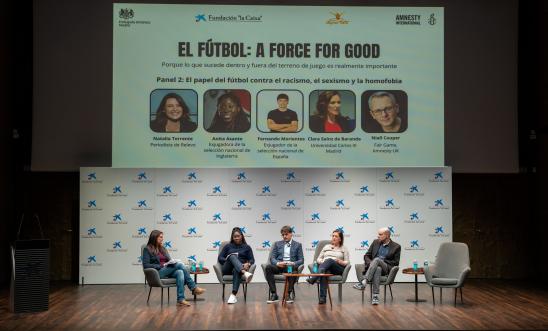
Press releases
Spain / UK: Football community unites to tackle discrimination

Leading figures in the world of football came together with civil society and diplomats to tackle sexism, racism and homophobia in the game, at a joint Amnesty International and UK Embassy forum in Madrid on Monday (11 December).
Former Spanish international Fernando Morientes and ex-England international Anita Asante joined representatives of the La Liga Foundation, Leicester City, Real Betis and others for the anti-discrimination event at the Caixa Forum in Madrid.
The event marks both Human Rights Day and World Football Day and was organised to address systemic discrimination in the game, and to look at the positive role football can play to tackle various forms of abuse in society. These include the work of football club foundations like Leicester City in the Community and Real Betis’ Foundation which run programmes to engage marginalised communities and promote inclusion, and Comfort Angels, a team representing refugee women from countries including Albania, Sudan, Nigeria, Pakistan and Ethiopia, helping them to feel welcome and connected in their community.
Many within football recognise that much more needs to be done if the game is to be truly inclusive. From sexism to racial abuse, to homophobic chants and rampant online abuse, the panellists joined forces to look at how best to address these persistent issues that blight the beautiful game.
In August, systemic sexism at the highest level of the game was laid bare when former Spanish FA president Luis Rubiales forcibly kissed Spanish international Jenni Hermoso without her consent during the World Cup Final presentation. The incident overshadowed the pinnacle moment in women’s football and led to an outpouring of women sharing their experiences of misogyny at all levels of the game.
Football also has the power to unite, and the forum looked at positive examples football plays to create welcoming and sustainable communities. One example is Amnesty International UK’s Football Welcomes campaign which celebrates the contribution players from a refugee background make to the game. The initiative highlights the leading role football can play in creating more welcoming communities for refugees.
But more needs to be done and that is why these panellists have come together to see how discrimination can be eliminated.
Anita Asante, renowned former England international turned coach, said:
“It’s sad that we still see much discrimination in football. With integrity and courage, we must stand up against divisive and hateful actions and rhetoric.
“Lots of people identify with football, wherever they are from and whatever their background, so that is why I proudly stand and speak up against racism, sexism and homophobia in and off the game.”
The British Ambassador to Spain Hugh Elliott, who opened the event, stated that:
"Millions of people around the world follow their favourite teams every week, and this is a great opportunity for football to be a force for good and to defend human rights. Racism, sexism and homophobia have no place on or off the pitch.”
In response to the recent reports of sexism and racism towards football players in Spain, Carlos de las Heras, Amnesty International Spain’s Head of Sport and Human Rights, said:
“It is imperative that both sports institutions and the Spanish authorities commit to zero tolerance of sexual and racist violence. There must be no repeat of incidents like what happened after the World Cup final when the then-President of the Spanish Football Association without consent kissed player Jenni Hermoso. Nor can the racist behaviour and attitudes that the player Vinicius Jr. suffered during last season continue.”
It’s important to welcome refugees who have fled conflict and persecution to the game of football, in response, Naomi Westland, Amnesty International UK’s Head of Football Welcomes, said:
“Everyone - from politicians to football clubs and their fans - has a role to play in creating more welcoming communities for people who have been forced to flee their homes.
“There is more that unites us than divides us and it’s great to see football clubs embracing this through initiatives like Amnesty’s Football Welcomes programme.
“We will continue to work with football organisations to promote respect, understanding and inclusion in communities.”
The panel discussions and participants at the joint Amnesty International and UK Embassy event included:
How football can create welcoming and sustainable communities
- Allison Tripney, Community Director, Leicester City;
- Comfort Etim, founder of women’s refugee team, Comfort Angels;
- Clemente Villaverde, President, Fundación La Liga;
- Rafa Muela, General Manager, Real Betis Balompié;
- Naomi Westland, Head of Football Welcomes, Amnesty International UK
The role of football in tackling racism, sexism and homophobia
- Anita Asante, football coach and former England player;
- Fernando Morientes, former Spain International;
- Carlos de las Heras, Head of Sport and Human Rights, Amnesty International Spain
- Clara Sainz de Baranda, Associate Professor of Journalism at Universidad Carlos III, and Vice-president of the Women's Association for Professional Sports.